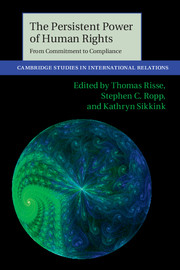Book contents
- Frontmatter
- Contents
- Figures
- Tables
- Contributors
- Preface
- Part I Introduction and stock-taking
- 1 Introduction and overview
- 2 The power of human rights a decade after
- 3 From ratification to compliance
- Part II Conceptual and methodological issues
- Part III From ratification to compliance
- Part IV From commitment to compliance
- References
- Index
2 - The power of human rights a decade after
From euphoria to contestation?
Published online by Cambridge University Press: 05 March 2013
- Frontmatter
- Contents
- Figures
- Tables
- Contributors
- Preface
- Part I Introduction and stock-taking
- 1 Introduction and overview
- 2 The power of human rights a decade after
- 3 From ratification to compliance
- Part II Conceptual and methodological issues
- Part III From ratification to compliance
- Part IV From commitment to compliance
- References
- Index
Summary
When The Power of Human Rights: International Norms and Domestic Change (PoHR) was published, practitioners, state governments and human rights scholars around the world celebrated the fiftieth anniversary of the Universal Declaration of Human Rights (1948) and the tenth anniversary of the fall of the Iron Curtain. A series of important developments in the world, including rapid ratification of human rights treaties, the incorporation of human rights criteria in foreign policy, and humanitarian interventions justified by human rights concerns, had fueled the perception that nothing could stop the progression of human rights norms. This collective euphoria of a sea change in international relations provided the international context for the “spiral model,” as an explanation for human rights change introduced in PoHR.
The PoHR was part of and further propelled constructivist research in international relations, especially in research on socialization by international institutions and norms, on regime effectiveness and compliance, on arguing and persuasion, and on “soft” compliance mechanisms, such as social sanctions (“shaming”) and supervision (Checkel 1998; Finnemore and Sikkink 1998; Simmons 2009).
The book signified a “transformationalist” possibility: the emergence of a global political arena that reshapes the conditions and dynamics of both domestic and international politics without the corresponding emergence of an international state (Barnett and Sikkink 2008; Lynch 2000: 93). h e spiral model provided the lenses through which domestic political activists could reconsider the strategic options vis-à-vis their government. Domestic groups were no longer seen as victims but could actively shape the context in which they were operating by transnationalizing domestic issues.
- Type
- Chapter
- Information
- The Persistent Power of Human RightsFrom Commitment to Compliance, pp. 26 - 42Publisher: Cambridge University PressPrint publication year: 2013
- 23
- Cited by



